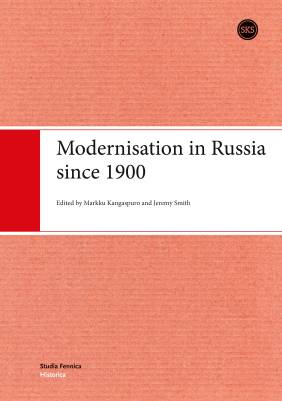Modernisation in Russia since 1900
Kangaspuro, Markku; Smith, JeremyProduct information
| Title: | Modernisation in Russia since 1900 | ||
| Authors: | Kangaspuro, Markku (Editor) Smith, Jeremy (Editor) |
||
| Product number: | 9789517468541 | ||
| Product form: | Paperback | ||
| Availability: | Delivery in 7-14 workdays | ||
| Price per piece: | 45,00 € (39,65 € vat 0 %) | ||
|
|||
| Publ. product code: | 1338421 |
| Publisher: | Suomalaisen Kirjallisuuden Seura |
| Series: | Studia Fennica. Historica 12 |
| Edition: | 2006 |
| Publication year: | 2006 |
| Language: | English |
| Pages: | 331 |
| Product family: | History Studia Fennica Historica Books in English |
| Finnish library classification: | 97.1 Venäjän ja Neuvostoliiton historia |
| YSO - General Finnish ontology: | modernisaatio, yhteiskunnallinen muutos, bolševismi, sosialismi, postkommunismi, siirtymätalous, historia |
| Key words: | societal change, modernisation, bolshevism, Socialism, postcommunism |
Modernisation has been a constant theme in Russian history at least since Peter the Great launched a series of initiatives aimed at closing the economic, technical and cultural gap between Russia and the more 'advanced' countries of Europe. All of the leaders of the Soviet Union and post-Soviet Russia have been intensely aware of this gap, and have pursued a number of strategies, some more successful than others, in order to modernise the country. But it would be wrong to view modernisation as a unilinear process which was the exclusive preserve of the state. Modernisation has had profound effects on Russian society, and the attitudes of different social groups have been crucial to the success and failure of modernisation.
This volume examines the broad theme of modernisation in late imperial, Soviet, and post-Soviet Russia both through general overviews of particular topics, and specific case studies of modernisation projects and their impact. Modernisation is seen not just as an economic policy, but as a cultural and social phenomenon reflected through such diverse themes as ideology, welfare, education, gender relations, transport, political reform, and the Internet. The result is the most up to date and comprehensive survey of modernisation in Russia available, which highlights both one of the perennial problems and the challenges and prospects for contemporary Russia.
This volume examines the broad theme of modernisation in late imperial, Soviet, and post-Soviet Russia both through general overviews of particular topics, and specific case studies of modernisation projects and their impact. Modernisation is seen not just as an economic policy, but as a cultural and social phenomenon reflected through such diverse themes as ideology, welfare, education, gender relations, transport, political reform, and the Internet. The result is the most up to date and comprehensive survey of modernisation in Russia available, which highlights both one of the perennial problems and the challenges and prospects for contemporary Russia.





